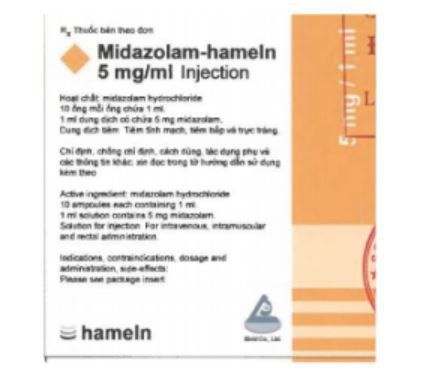This is an automatically translated article.
Buspirone is a drug belonging to the azaperone group of drugs with anxiolytic activity, but not for sedative, muscle relaxant and anticonvulsant effects. The mechanism of action of the drug is not fully understood, but it is believed that the effect of Buspirone is due to the action on serotonin receptors.
1. What is buspirone?
What is buspirone? Buspirone is an anti-anxiety medication. This is a condition that occurs when the chemicals in the brain are out of balance. The drug is usually made in the form of tablets, the strength of 5 mg or 10 mg.
2. Effects of Buspirone
Buspirone is a medication used to treat anxiety symptoms such as fear, nervousness, irritability, dizziness, pounding heartbeats, and other physical symptoms, which may or may not be accompanied by symptoms. depression . Buspirone is used to treat generalized anxiety disorder (GAD).Note that Buspirone is not an antipsychotic and should not be used as a substitute for medication prescribed by a doctor for mental disorders.
Buspirone helps patients think more clearly, relax, worry less, integrate more into daily life. Buspirone can help patients feel less restless, irritable, and control symptoms such as trouble sleeping, sweating, and a strong heart rate. Buspirone is effective in treating neurotransmitters in the brain.
3. How to use Buspirone
Buspirone is taken by mouth, usually 2-3 times a day or as directed by your doctor. Patients can take Buspirone with or without food. It is important when taking Buspirone to adhere to treatment so that the amount of drug absorbed into the body is always at the same level each day.
Buspirone in tablet form can be divided according to the prescribed dose, follow the instructions for use or or ask your pharmacist about how to divide the pill for each dose.
Limit eating or drinking grapefruit juice (less than a quarter of a liter a day) during treatment with Buspirone, grapefruit may increase the blood concentration of buspirone in the patient.
The dose of Buspirone is prescribed based on the patient's medical condition and ability to respond to treatment. Using buspirone regularly for the best effect, patients should take it at the same time each day.
When you first start taking Buspirone, anxiety symptoms may initially get worse and then gradually improve, it can take up to a month or longer for the medication to fully work.
4. Dosage of Buspirone
Usual dose of Buspirone for adults in the treatment of anxiety:
Starting dose of Buspirone: 7.5mg/time, 2 times/day or 5mg/time 3 times/day; Maintenance dose of Buspirone: The daily dose can be increased by 5mg every 2-3 days, up to 20-60mg/day, divided into several oral doses; The maximum dose of Buspirone can be up to 60 mg per day. Pediatric Dosage of Buspirone: Although Buspirone is not FDA-approved for use in any patient under 18 years of age, it can still be used in children and adolescents under medical supervision. closely and in appropriate doses. Usual Buspirone dosage for children to treat anxiety between the ages of 6 and 18 years:
Starting dose of Buspirone : 2.5 - 10 mg daily; Maintenance dose of Buspirone: The daily dose can be increased by 2.5 mg every 2-3 days, can be increased to 15-60 mg/day, can be divided into 2 oral doses/day. Dosage of Buspirone in elderly patients: Use the same dose of Buspirone as adults.
Dosage of Buspirone in patients with impaired renal function: Use with caution and should be used at low doses, twice a day. Patient response and symptoms should be carefully evaluated before increasing the dose of Buspirone. Buspirone should not be used in patients with severe renal impairment (creatinine clearance < 20 mL/min/1.72 m2).
Dosage of Buspirone in patients with impaired liver function: Should be used with caution and the dose should be carefully adjusted to reduce the risk of undesirable effects on the central nervous system. When increasing the dose of Buspirone should be carefully considered after 4-5 days of taking the previous dose. Buspirone should not be used in patients with severe hepatic impairment.
It should be noted: The dose of Buspirone is for reference only, patients need to take the drug exactly as directed when prescribed by a doctor.
5. Contraindications of Buspirone
Contraindications of the drug Buspirone in the following cases:
Patients with hypersensitivity to the main active ingredient or to any component of the drug Buspirone; Severe impairment of kidney or liver function; Acute intoxication with: alcohol, sleeping pills, pain relievers, antipsychotics; Epilepsy ; Patient has been taking monoamine oxidase inhibitors (MAOIs) within the previous 14 days. Contraindications to Buspirone here should be understood as absolute contraindications, meaning that for any reason, contraindications can be flexible in using the drug.
6. Side effects of Buspirone
During the use of Buspirone, patients need to pay attention to some of the following:
Common side effects of Buspirone: Anxiety, insomnia, attention disorders, depression, confusion, sleep disturbances sleep, anger, excitement, abnormal coordination, tremor, dizziness, headache, blurred vision, ringing in the ears, tachycardia, chest pain, nasal congestion, pain in the oropharynx, nausea, abdominal pain, dry mouth , diarrhea, constipation, cold sweats, rash, musculoskeletal pain, fatigue. Rare side effects of Buspirone: psychosis, hallucinations, personality changes, dyskinesia, Serotonin syndrome, convulsions, extrapyramidal effects, Parkinson's, restless legs syndrome, tubular vision, confusion tone, ataxia, forgetfulness, restlessness, urinary retention.
7. What to note when using Buspirone
During the use of Buspirone, patients should pay attention to the following issues:
Busspirone should be used with caution in patients with: Acute narrow-angle glaucoma, myasthenia gravis, dependence medication, history of liver failure, kidney failure; Avoid alcohol while taking Buspirone; Buspirone has not shown cross-tolerance with benzodiazepines and other commonly used sedatives. Buspirone does not prevent the withdrawal symptoms that are common when treatment with these drugs is stopped. Patients should gradually discontinue these drugs before starting treatment with Buspirone; Buspirone should not be used as monotherapy for the treatment of depression, as Buspirone may mask clinical signs of depression; Children: The safety and long-term effectiveness of Buspirone have not been established in pediatric patients under 18 years of age, so Buspirone is not recommended in children and adolescents unless clearly needed; Concomitant use of Buspirone and serotonergic agents such as: MAO inhibitors, selective serotonin reuptake inhibitors (SSRIs), serotonin norepinephrine reuptake inhibitors (SNRIs), or tricyclic antidepressants can lead to serotonin syndrome, which can even be life-threatening. If necessary, the combination should be carefully monitored, especially during the initiation and increase of the dose of Buspirone. Symptoms of serotonin syndrome include: altered mental status, autonomic nervous system disorders, neuromuscular abnormalities, gastrointestinal symptoms. If serotonin syndrome is suspected, the dose of Buspirone should be reduced or treatment discontinued depending on the severity of symptoms; There are limited data on the use of Buspirone in pregnant women, undesirable effects have been reported after high doses of Buspirone, so it is best to avoid the use of Buspirone during pregnancy. ; It is not known whether buspirone or buspirone metabolites are excreted in human milk, therefore the decision to discontinue nursing or to discontinue buspirone treatment should take into account the benefits of breast-feeding and the benefit of this therapy for the mother; Buspirone may cause drowsiness, dizziness, cognitive impairment affecting the ability to drive and use machines; There is no specific antidote to Buspirone. This active substance is also not removed by hemodialysis. In case of overdose, Buspirone should be emptied of the stomach as quickly as possible, accompanied by symptomatic and supportive treatment. Consider activated charcoal if the patient is hospitalized within 1 hour of taking more than 5 mg/kg of buspirone, provided the patient is not too drowsy. Buspirone is an azaperone drug that has anxiolytic activity, but does not have sedative, muscle relaxant and anticonvulsant effects. To ensure the effectiveness of treatment, patients need to carefully read the instructions, and at the same time strictly follow the instructions of the doctor or pharmacist, do not arbitrarily change the dosage or use in any case. without a doctor's instructions.
Follow Vinmec International General Hospital website to get more health, nutrition and beauty information to protect the health of yourself and your loved ones in your family.
Please dial HOTLINE for more information or register for an appointment HERE. Download MyVinmec app to make appointments faster and to manage your bookings easily.













